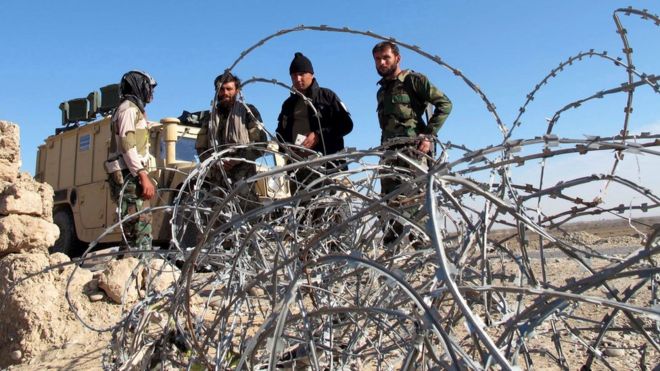Afghanistan, Limping Into Its Future
"It will continue to be a train, assist and advise operation."
"We are now looking into requests regarding some areas like more education, for the military academies, but also training special operation forces and air forces [in Afghanistan]."
NATO Secretary-General Jens Stoltenberg
"Since 2001, the United States and its international partners have expended substantial resources to secure, stabilize, and rebuild Afghanistan. Recent developments, however, indicate that progress toward these strategic goals is slipping. The Taliban has seized swaths of rural Afghanistan in such provinces as Helmand, Uruzgan, Nangarhar, and Kunduz. Over the past year, Taliban forces have also conducted several offensives against district and provincial capitals. In September 2015, for example, the northern city of Kunduz temporarily fell to the Taliban before being retaken by government forces. Meanwhile, the effectiveness of the National Unity Government continues to be undermined by poor governance and internal friction between President Ashraf Ghani, Chief Executive Officer (CEO) Abdullah Abdullah, and their supporters. A significant worsening of the political and security situations in Afghanistan over the next twelve to eighteen months is therefore plausible. More specifically, there is a growing risk that the current National Unity Government in Kabul could collapse because of a defection by Abdullah, a severe economic crisis, the establishment of a parallel government, or a coup d’état. There is also a growing possibility that the Taliban could gain substantial territory in one or more cities. These contingencies would amount to a strategic reversal for the United States, since Washington was instrumental in helping create the National Unity Government in 2014. These developments would also likely increase the presence of Islamic extremist groups, including al-Qaeda, and intensify security competition between such regional powers as nuclear-armed India and Pakistan."
Seth G. Jones, Director, International Security and Defense Policy Center, RAND Corporation
 |
| New recruits to the Afghan army Special Forces take part in a military exercise in Rishkhur district outside Kabul. —Reuters |
General John Nicholson, top U.S. commander in Afghanistan, recently informed a U.S. Senate Armed Services Committee that Russia has claimed the Taliban have been busy fighting 'terrorists' aka, al Qaeda and Islamic State in Afghanistan, while the government itself is not engaged in confronting ISIL and the al-Qaeda presence. It should be recalled, needless to say, that it was during the Taliban administration of Afghanistan from 1996 to 2001 that Osama bin Laden and al-Qaeda found their niche in the country as honoured guests of the Taliban.
As General Nicholson sees it, Moscow has been busy giving an aura of legitimization to the Taliban in an effort to undermine the presence of the United States and NATO in Afghanistan. As the commander would have it, Afghan security forces have managed to reduce the number of ISIL fighters in the country by fifty percent, and the territory held by the Taliban by two-thirds. Representatives of the Taliban, China, Pakistan were invited to Moscow for meetings related to the future of Afghanistan, according to General Nicholson, with Afghan officials pointedly excluded.
Billions of dollars in international aid has been sunk into the country, NATO military members have given their lives in an effort to help Afghanistan battle the Islamists' ambition to restore their rule in the country. Even after the general mass of the foreign military was disbanded and returned to their home countries, a significant number remained behind in Afghanistan to continue training Afghan troops and police. Afghanistan has many problems; chief among them the active malice and violent interference of its neighbour Pakistan.
Internally, its own endemic corruption has harmed any advances the nation could have achieved with the help of foreign investors and aid groups. The rate of AWOL desertion from both the Afghan military and its national police has been enormous. The fact that the military and the police have defected to the Taliban in numbers, infiltrating both and involving suicide attacks on civilians and on the military alike remains a problem for the country. So how much of an ongoing commitment to the future welfare of the country is the responsibility of outside sources?
 |
| The Taliban's capture of the strategically-located Sangin, once considered the deadliest battlefield for US and British troops in Afghanistan, will increase the group's mobility in the north of the province and give it control of an important supply line with the provincial capital Lashkar Gah EPA |
Yet the request for voluntary commitments by NATO member-nations to pledge to commit additional troops presence in a country that never seems to be able to get ahead of its violent destabilization will be front and centre at the May 25 NATO summit in Brussels. Evidence exists that the Taliban are once again in control of roughly 40 percent of Afghanistan. Of the 13,000 coalition and NATO troops remaining in Afghanistan -- mostly involved in training -- 7,000 are American.
As well as that number, yet another 1,400 U.S. special forces operate in Afghanistan on combat missions against the Taliban, and targeting as well missions against the Islamic State of Iraq and the Levant. With all the help in the past sixteen years that Afghanistan has received from the U.S., NATO and other UN members to extricate itself from the thrall of the Taliban, their own security forces remain plagued by weak leadership and corruption, reflective in part and in whole, of the entire country's situation.
During the first six weeks of 2017, 807 Afghan security personnel were killed and over 1,300 wounded by clashes with the Taliban. As for civilian casualties, they have skyrocketed since the United Nations began documenting them in 2009. One can only wonder, is there any hope for the future of this troubled, violence-tormented country whose history is replete with what the present reflects and its future further inexorably portends?
Labels: Afghanistan, Conflict, NATO, Taliban, United States
0 Comments:
Post a Comment
<< Home